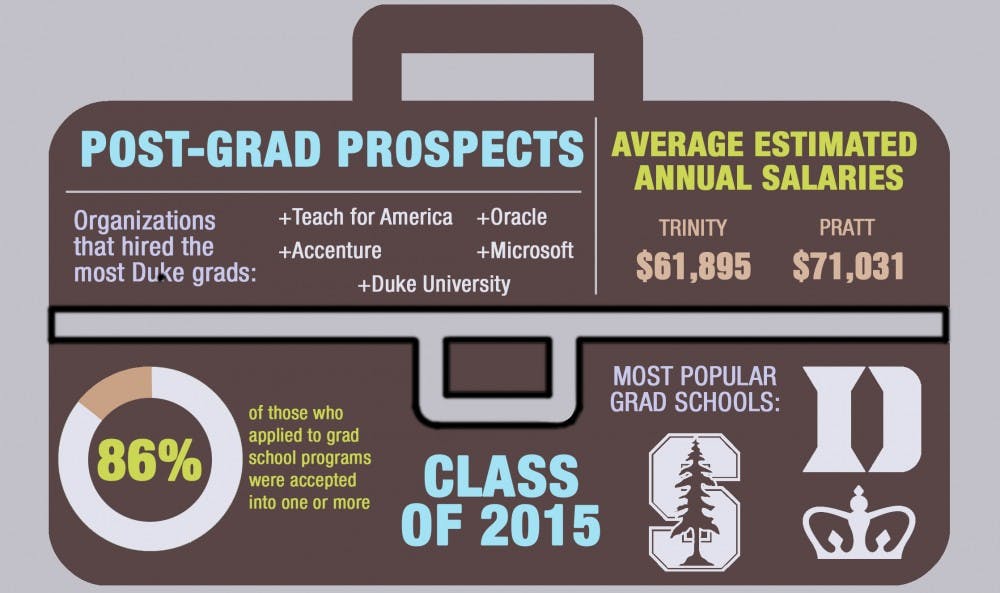Although Duke is known for churning out qualified pre-med students, less than 25 percent of the Class of 2015 attended graduate or professional schools, according to the Career Center senior survey.
Statistics from the survey show that most Duke students successfully transition from their senior year of college to employment or graduate and professional schools. For many seniors, the search for these post-graduation opportunities occupies much of their final year. The job search typically involves either on-campus recruiting for consulting, engineering, computer science and financial service firms or networking for positions in public policy, the arts and the humanities, said William Wright-Swadel, Fannie Mitchell executive director of the Career Center.
“We spend a lot of time here in the Career Center helping students figure out what they want to do and then how to attack that particular market,” Wright-Swadel said.
Although data on the Class of 2016 will not be available until next Spring, statistics for the Class of 2015 from the annual senior survey suggest that a majority of seniors accept full-time employment or graduate school offers by the spring. Almost 70 percent of students reported that they planned on having full employment, part-time employment or self-employment after graduating. Of those students, 56.4 percent had already accepted positions by the time the survey was administered—April and May of this year.
In the past four years, the five organizations that hired the most Duke graduates were Accenture, Duke University, Oracle, Microsoft and Teach for America. The average estimated annual salaries for graduates of the Trinity College of Arts and Sciences and Pratt School of Engineering for their first jobs after college were $61,895 and $71,031, respectively.
Additionally, 23 percent of the Class of 2015 applied to graduate and professional school programs. Of those students, 85.8 percent had been accepted to one or more programs by the time of the survey. The most popular graduate schools last year were Duke, Stanford University and Columbia University.
Senior Devin Solanki noted that there are three categories of Duke seniors who are looking for jobs.
“There are those that have a job or are set on their job. There’s another group that has opportunities, but doesn’t know what to decide. And [there are] those now coming into the deadline really hard,” he said.
Those who have already received job offers can focus on enjoying their senior year. Senior Diego Nogales, who will be working at the Royal Bank of Canada next year, said that he is fully appreciating his last year at Duke by overloading in classes to pursue different academic interests.
However, Solanki noted that students still looking for jobs or graduate school acceptances can feel stressed as those around them receive offers.
“A job search can be very stressful if you don’t know where you see yourself, if you don’t know the things that make you happy,” said Danica Liu, a senior majoring in neuroscience.
The job search process has changed in recent years, Wright-Swadel said. For instance, students may need to begin the job hunt earlier than their final year.
“I think that the notion that a student looks for a job during senior year is a little antiquated,” he said.
Nogales agreed, noting that junior year is a crucial one for students interested in finance, as they are expected to network with different companies and obtain summer internships that could eventually lead to jobs.
Jonah Yousif, a senior biology major currently applying to medical school, explained that his primary application for medical school was due before the beginning of senior year.
“You have to know your future earlier and earlier,” he said. “My dad turned his application in October or December, got the interview two weeks later and found out a week later whether he got in.”
Although the search for post-graduate opportunities can often feel like the most important part of senior year, some students noted that their jobs should not define them.
“It’s important to develop parts of yourself that are outside of your career,” Liu said. “Not all of your self-worth is placed in your career.”
Get The Chronicle straight to your inbox
Signup for our weekly newsletter. Cancel at any time.

